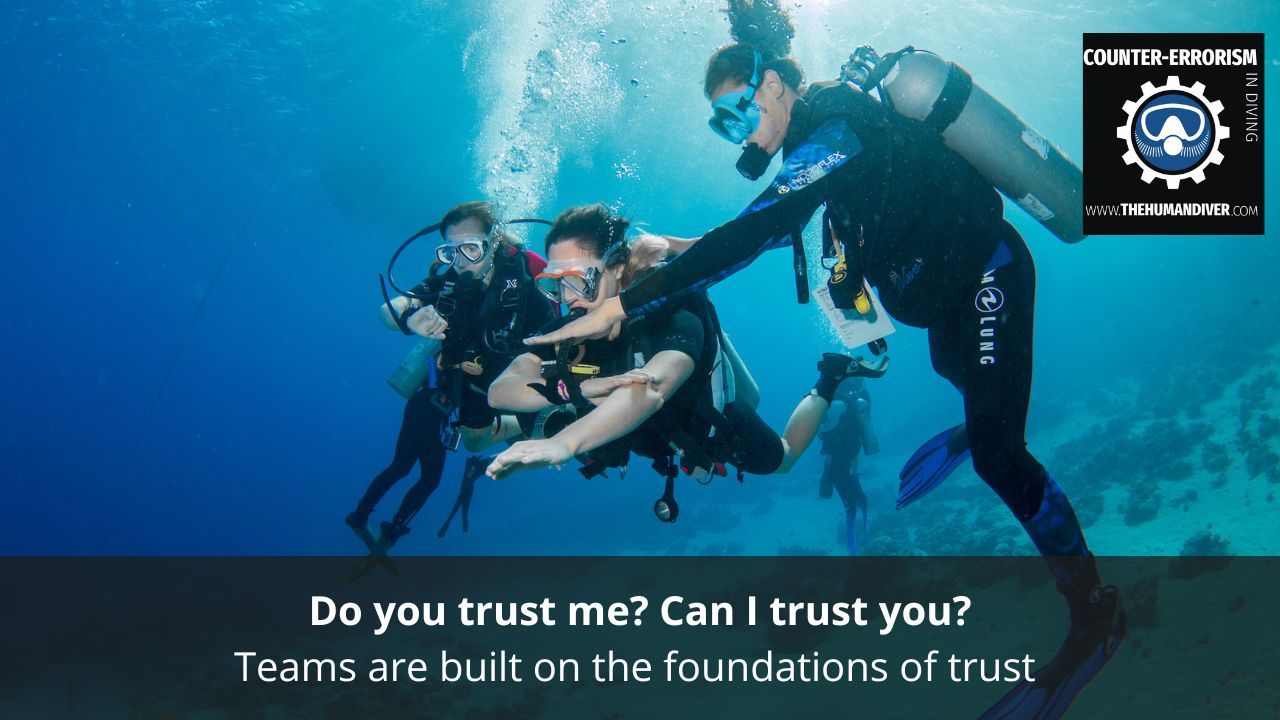
Do you trust me? Can I trust you?
In the late 1940s, there was a small-time thief called William Thompson who used to walk around New York City as a well-dressed gentleman and start conversations with strangers as if he knew them. After a bit, he would ask them “have you confidence in me to trust me with your watch until tomorrow?”. They sometimes did, in which case he walked off, never to be seen again. When he was finally caught, the newspapers reported him as “The Confidence Man” and coined the term. The New York Evening Post stated that one of his victims was a pastor and he gave Thompson some money after Thompson himself had offered to lend the man money. He then challenged the pastor by saying “You, would not place such confidence in me.”

What does this have to do with human factors? Well, trust is a major factor when it comes to teamwork. Simon Sinek explains trust using a quote from the Navy Seals; “I may trust you with my life, but do I trust you with my money and my wife?”. In other words, your ability may be high but what about your integrity? William Thompson demonstrated his integrity to the pastor by offering to lend him money first. Once he had shown that, the man then felt he could trust this man whom he didn’t even know. It’s exactly the way many scams work.
So this shows that integrity is important. Sure, anyone is capable of looking after someone’s money for a short period. Ability needs to be there to have a degree of trust. But how many people have proved that they are honest enough to give it back?
When it comes to teams, integrity is far more important than ability. The difficulty comes in proving that one has integrity. Unless integrity is tested, we rarely know for sure who we can actually trust. Luckily, as humans, we’re able to pick up on very small things, so it often only takes routine tasks to begin building integrity and therefore trust. Turning up on time, bringing equipment that you said you’d provide or following the agreed dive plan are all part of this. Generally, we’ll have already demonstrated our skills in some way before joining the team, either through an interview, practical assessment (such as a dive course) or someone else vouching for us. In informal settings like on a dive boat, you might end up meeting your new buddy whose abilities you slowly learn by simply diving together. From there, examples like that above help to build integrity and trust, which explains why so many people end up with lifelong friends from a diving trip!

So we have two foundational components of trust; skills and integrity. But there’s one other factor that is of possibly even greater importance, and that’s benevolence. If we believe someone is doing something in our best interests, the chances are that we will build trust with them quicker and more solidly than if we merely believe they are honest and have the skills needed. Think about people in your own life who you trust. Chances are that they’re the ones who you ask when you need help because you know they actually care about you. This transfers across everyone, from friends and colleagues to dive buddies, members of a club or even public figures. If we no longer believe someone is acting in a way that shows they have our consideration in mind, then the chances are we have lost trust in them. And that can be the most difficult trust to rebuild.

The author and human behaviour expert Shane Snow describes it as 3 building blocks. Ability is at the top. If we lose that, trust can still be maintained, as it is accepted that everyone makes mistakes sometimes. Integrity is in the middle, if that is broken it is still possible to rebuild trust. However benevolence is the foundation- without that, trust is done.
Luckily for us as divers who often don’t see ourselves as being part of a team, there is a natural tendency for people with a shared “identity” to trust each other. In other words, I am a diver and if you are a diver you must be trustworthy. Every time we get in the water with another diver (whether we know them well, slightly or not at all), we are forming a team. We need to work together to complete our goal, even if that goal is just to have a fun dive. If we’re only completing one dive together we will only be able to judge that trustworthiness on ability but if we’re planning on diving together again it’s worth bearing in mind the other factors. In diving terms what’s the easiest way to show benevolence? How about one of the most basic ways humans have been doing for years- tea, coffee or cola anyone?

An Integrative Model of Organisational Trust: https://www.jstor.org/stable/258792?seq=7#metadata_info_tab_contents
Trust in teams: https://journals.sagepub.com/doi/full/10.1177/0018726718818721
Patrick Lencioni's Five Dysfunctions of a Team. Foundation is Trust. https://medium.com/@leenasn/book-summary-the-five-dysfunctions-of-a-team-f3299a1f1a3c
Jenny is a full-time technical diving instructor. Prior to diving, she worked in outdoor education for 10 years teaching rock climbing, white water kayaking and canoeing, sailing, skiing, caving and cycling, among other sports. Her interest in team development started with outdoor education, using it as a tool to help people learn more about communication, planning and teamwork.
Since 2009 she has lived in Dahab, Egypt teaching SCUBA diving. She is now a technical instructor trainer for TDI, advanced trimix instructor, advanced mixed gas CCR diver and helitrox CCR instructor.
Jenny has supported a number of deep dives as part of H2O divers dive team and works as a safety diver in the stunt industry.
If you'd like to deepen your diving experience, consider taking the online introduction course which will change your attitude towards diving because safety is your perception, visit the website.

